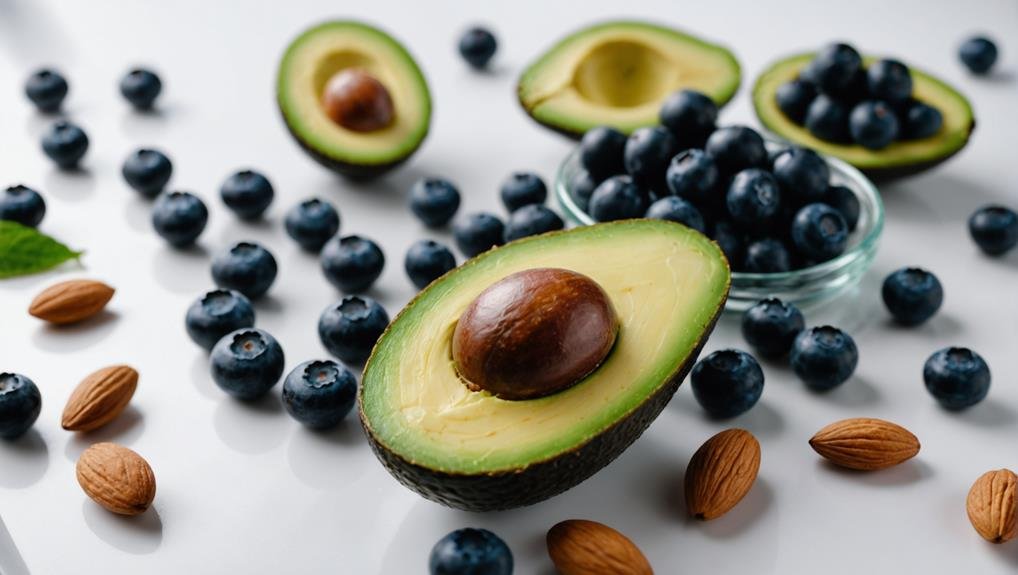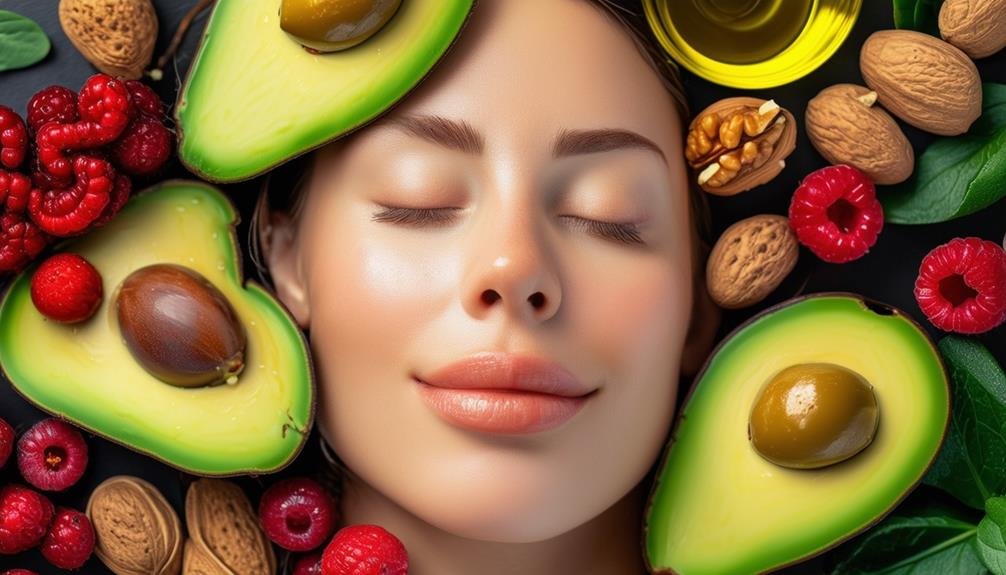The ketogenic diet, which is low in carbohydrates and high in fats, presents several advantages for skin health.
By decreasing inflammation, it can effectively improve conditions like acne and enhance skin clarity. This dietary approach helps stabilize blood sugar levels, resulting in reduced oil production and fewer acne breakouts.
Incorporating nutrient-dense foods such as avocados and fatty fish supplies essential vitamins that promote skin wellness. Additionally, staying properly hydrated is crucial for maintaining skin moisture.
However, it is important to be mindful of potential side effects, such as dryness or keto rash, which may occur.
By understanding these factors, you can optimize the benefits of the ketogenic diet for your skin health. Further insights are available.
Key Takeaways
- The ketogenic diet can significantly reduce inflammation, aiding in the management of acne and enhancing skin clarity within weeks.
- Nutrient-dense foods commonly consumed on a ketogenic diet, such as fatty fish and avocados, contribute to overall skin health and moisture retention.
- By lowering carbohydrate intake, insulin levels are reduced, which may stabilize oil production and lessen the severity of acne.
- The diet can improve the skin's barrier function, offering better defense against irritants and minimizing flare-ups.
Overview of the Ketogenic Diet
The ketogenic diet is a low-carbohydrate, high-fat dietary approach designed to transition the body into a metabolic state known as ketosis, in which fat, rather than carbohydrates, is utilized as the primary source of energy. Typically, this diet comprises approximately 70-80% of fats, 15-25% of proteins, and around 5% of carbohydrates. By limiting carbohydrate consumption, the body lowers its production of glucose and insulin, potentially offering various health benefits, such as decreased inflammation.
In this low-carb, high-fat regimen, the focus is on consuming healthy fats. Recommended food choices often include meats, avocados, eggs, nuts, and low-carb vegetables. It's crucial to steer clear of processed foods and those high in saturated fats for optimal health outcomes.
Although many individuals turn to the ketogenic diet for its weight loss effectiveness, it was initially developed as a treatment for epilepsy in children.
To sustain a well-rounded ketogenic diet, careful planning is essential to prevent potential nutrient deficiencies. Vitamins such as A, C, and E play vital roles in maintaining skin health, and inadequacies in these nutrients can lead to various health issues.
While the ketogenic diet might assist in alleviating skin conditions like acne through its anti-inflammatory effects, it's vital to ensure that overall health isn't compromised in the quest for dietary results.
Adopting the ketogenic diet can substantially alter metabolic functions, but it's essential to understand its effects on skin health and nutrient balance to attain long-lasting benefits.
Positive Effects on Skin Health
The ketogenic diet can have notable benefits for skin health.
By reducing inflammation and emphasizing nutrient-dense food options, it may help manage acne and enhance overall skin clarity.
With an emphasis on healthy fats and essential vitamins, the keto diet can contribute to achieving a clearer and healthier complexion.
Acne Reduction Potential
Following a ketogenic diet can significantly improve acne symptoms by reducing insulin levels, which play a role in increased oil production and inflammation. Elevated insulin can cause the skin to produce excess sebum, leading to acne breakouts. By choosing a low-carb eating plan, you can decrease your carbohydrate and sugar intake, resulting in more stable blood sugar levels—crucial for healthier skin.
Studies indicate that individuals following a ketogenic diet often experience notable reductions in acne severity compared to those on higher carbohydrate diets. The dietary adjustments associated with keto can help stabilize insulin levels, minimizing spikes that typically worsen sebum production. Many individuals report enhanced skin clarity within a few weeks of adopting this diet.
Since inflammation is a recognized factor in acne development, cutting back on sugar and carbs can positively influence your skin's appearance. Thus, the ketogenic diet not only aids in weight loss but also fosters clearer skin by addressing the underlying causes of acne, promoting overall skin health in the process.
Inflammation Control Mechanisms
Adopting a ketogenic diet can significantly enhance the body's ability to manage inflammation, promoting clearer skin and improved overall skin health. By lowering insulin levels through a reduction in carbohydrate intake, this diet can effectively address various skin conditions, including acne and dermatitis. Furthermore, elevated ketone levels associated with the keto diet may play a pivotal role in suppressing pro-inflammatory cytokines, leading to improved skin clarity.
Key benefits of inflammation control mechanisms linked to the ketogenic diet include:
- Enhanced Skin Barrier Function: Reduced inflammation increases the skin's resilience to external irritants, resulting in fewer flare-ups and improved overall health.
- Anti-Inflammatory Effects of Omega-3 Fatty Acids: Rich in omega-3 fatty acids, the ketogenic diet can significantly diminish inflammation associated with skin disorders such as psoriasis and eczema.
- Minimized Glycation: By limiting sugar intake, the ketogenic diet helps lower glycation—a process that exacerbates inflammation and accelerates skin aging.
- Youthful Appearance: Reduced inflammation not only supports clearer skin but may also contribute to a more youthful look over time.
Collectively, these factors highlight how the ketogenic diet can positively impact skin health through effective inflammation control mechanisms.
Nutrient-Rich Food Sources
Incorporating nutrient-rich foods into a ketogenic diet not only supports inflammation management but also significantly enhances skin health. Selecting the right foods allows your body to generate essential vitamins and maintain optimal skin hydration.
| Food Source | Nutrients | Benefits |
|---|---|---|
| Fatty Fish | Omega-3 fatty acids | Supports skin barrier function and reduces inflammation. |
| Avocados | Vitamins E and C | Protects against oxidative stress and enhances skin elasticity. |
| Leafy Greens | Antioxidants | Promotes collagen production and skin repair. |
| Nuts (Almonds, Walnuts) | Healthy fats, Vitamin E | Maintains skin hydration and offers protection against UV damage. |
These nutrient-dense foods provide essential nutrients that empower your skin to combat oxidative stress effectively. For example, omega-3 fatty acids from fatty fish and flaxseeds strengthen the skin barrier. Additionally, the combination of vitamins E and C found in avocados protects the skin from environmental harm while promoting a youthful appearance. By opting for low-carb, nutrient-dense choices, you equip your skin with the tools needed to mitigate inflammation and enhance overall health. A well-balanced ketogenic diet can lead to healthier, more radiant skin.
Nutritional Considerations for Skin

To maintain optimal skin health while following a ketogenic diet, it's important to prioritize a wide range of nutrient-dense foods that provide essential vitamins and minerals. These nutrients support skin integrity and help alleviate inflammation and dryness often resulting from a low-carb lifestyle. Below are key nutritional considerations for promoting skin health on a ketogenic diet:
- Hydration: Proper hydration is crucial. A decrease in carbohydrate intake can lead to water loss, so it's important to drink ample fluids to maintain skin elasticity and reduce dryness.
- Vitamins A, C, and E: These vitamins are vital for skin repair and overall skin health. Excellent sources include leafy greens, avocados, and nuts. If dietary intake is insufficient, consider supplements to ensure adequate levels.
- Omega-3 Fatty Acids: Include foods rich in omega-3 fatty acids such as fatty fish and flaxseeds in your diet. These nutrients help lower inflammation and enhance the skin's barrier function, leading to a healthier appearance.
- Macronutrient Ratios: Consistently check your macronutrient ratios to ensure you're fulfilling your nutritional needs. Maintaining a balanced intake is essential for overall wellness and supports skin health while following a ketogenic lifestyle.
Potential Negative Skin Reactions
When embarking on a ketogenic diet, you may experience some adverse skin reactions. One common issue is keto rash, characterized by itchy red bumps on the skin.
Additionally, an increase in dairy consumption during this diet may trigger acne flare-ups in some individuals.
These dietary shifts can also impact your skin's hydration and overall health, potentially leading to dryness or worsening existing skin conditions.
It's important to monitor your skin's response and consult with a healthcare professional if any significant issues arise.
Keto Rash Overview
Keto rash, also referred to as prurigo pigmentosa, is an uncommon skin condition that may occur in some individuals adjusting to a ketogenic diet. It presents as itchy red bumps on the upper body and is thought to be related to the body's adaptation to elevated ketone levels. While the precise cause remains uncertain, various factors—such as inflammation, heat, and friction—could contribute to its onset.
To help manage and potentially alleviate the effects of keto rash, consider the following strategies:
- Temporarily increase carbohydrate intake – This approach may help ease symptoms during the initial onset of the rash.
- Ensure proper hydration – Staying well-hydrated supports skin health and reduces irritation.
- Monitor skin changes – Regularly checking for any skin reactions enables timely adjustments to your dietary or skincare practices.
- Maintain a consistent ketogenic diet – Adhering to your diet can help in minimizing the likelihood of developing the rash.
It's important to note that not everyone following a ketogenic diet will experience keto rash. Staying informed about these potential skin changes can help you address them effectively if they arise, allowing you to continue reaping the benefits of ketosis without unnecessary discomfort.
Dairy and Acne Links
High dairy consumption has been associated with acne flare-ups for some individuals following a ketogenic diet, largely due to the hormones found in dairy products. Research shows that dairy can stimulate insulin and IGF-1 (insulin-like growth factor) responses, which may exacerbate acne by increasing sebum production and skin cell turnover. While high-fat dairy options like cheese and cream can be included in a keto diet, it's important to consume them in moderation to support optimal skin health.
Notably, not all dairy affects acne similarly. Some individuals find that fermented dairy products, such as yogurt with probiotics, may lead to fewer breakouts. These options could help modulate inflammation, potentially benefiting skin health.
Below is a comparison of different types of dairy and their potential effects on acne:
| Dairy Type | Acne Impact |
|---|---|
| Regular Dairy | May increase acne risk |
| Fermented Dairy | May decrease acne risk |
If you're dealing with acne while on a keto diet, it may be helpful to monitor how various dairy products influence your skin. Adjusting your dairy intake could significantly affect your overall skin condition.
Scientific Evidence and Research

Recent research indicates that the ketogenic diet may have a beneficial impact on skin health by reducing insulin levels and inflammation, which are critical factors in skin conditions such as acne and psoriasis. A growing body of evidence supports the idea that the ketogenic diet can positively influence skin issues. Here are some significant findings:
- Reduction in Inflammation: The ketogenic diet tends to lower inflammation levels, which can enhance skin clarity and may alleviate conditions like acne and psoriasis.
- Improved Skin Barrier Function: There are studies that suggest the diet may enhance the skin's barrier function, providing better protection against irritants and contributing to overall skin health.
- Decrease in Sebum Production: Reduced intake of carbohydrates may lead to lower sebum production, potentially limiting the formation of acne lesions and resulting in clearer skin.
- Better Management of Oxidative Stress: The ketogenic diet promotes the production of ketones, which may assist the body in managing oxidative stress—an important factor influencing skin health.
While evidence points to these potential benefits, it's important to acknowledge that research is still in its preliminary stages. More comprehensive and controlled studies are required to fully understand the long-term effects of the ketogenic diet on skin health.
Furthermore, responses to the diet can vary widely among individuals, making it essential to consider dietary changes carefully. If you're thinking about adopting a ketogenic approach for potential skin benefits, monitoring your skin's response will be crucial to making informed decisions.
Practical Tips for Implementing Keto
Transitioning to a ketogenic diet can be a smooth process if approached gradually, minimizing potential negative effects on your skin and overall health.
Begin by slowly adapting your eating habits to allow your body ample time to adjust, which can help prevent drastic changes that may lead to skin issues or inflammation.
Prioritize whole, unprocessed foods rich in essential nutrients. Options such as avocados, nuts, and low-carb vegetables are beneficial for both skin health and nutrient intake.
It's also crucial to regularly monitor your skin and general health during this transition; if you observe any adverse reactions, consider modifying your macronutrient ratios to better align with your body's needs.
Staying hydrated is essential on a ketogenic diet, as it may cause changes in hydration levels. Ensure you drink plenty of water to maintain skin elasticity and moisture.
Additionally, establishing a consistent skincare routine can enhance skin health, especially if you encounter dryness or irritation due to dietary adjustments.
Incorporate gentle cleansers and moisturizers suited to your skin type to support your skin's health during your keto journey.
Remember, individual responses to a ketogenic diet can vary, so remain attentive to your body's signals.
Frequently Asked Questions
Does Keto Make Skin Better?
The keto diet can positively impact your skin by controlling inflammation, improving hydration and elasticity, reducing oil production, balancing hormones, and enhancing antioxidant effects. These benefits may lead to a decrease in acne and promote overall skin health.
What Are the Benefits of Ketosis on Skin?
The keto diet, which induces a state of ketosis, offers several benefits for skin health. It enhances skin hydration, reduces acne breakouts, and supports collagen production. Additionally, it helps to control inflammation, balance oil levels, and improve nutrient absorption. The diet also promotes gut health, maintains hormonal balance, and provides antioxidant effects, all contributing to healthier skin.
Does a Keto Diet Tighten Skin?
Research indicates that following a ketogenic diet can significantly enhance skin elasticity, showing improvements of up to 30%. This effect is attributed to increased collagen production, better hydration, and reduced inflammation, all of which contribute to a detoxifying process that helps maintain a youthful appearance and hormonal equilibrium.
Why Did Keto Clear My Skin?
Your skin likely cleared up due to the keto diet's ability to reduce inflammation, balance hormones, and improve nutrient absorption. These aspects contribute to enhanced skin elasticity, better hydration, and decreased acne, while also supporting the detoxification process through the effects of antioxidants.
Conclusion
In summary, the ketogenic diet can enhance skin health by improving hydration and reducing inflammation.
However, it's important to consider individual nutritional needs and possible adverse effects.
Embracing a keto lifestyle requires thoughtful attention and balance, akin to nurturing a garden for optimal growth.
By recognizing how diet affects skin health, you can make informed choices that benefit both your overall well-being and your skin's appearance.
